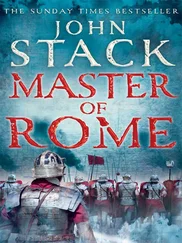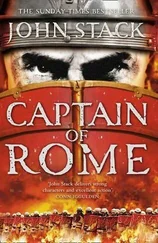With an additional twenty-five men below decks, the area was claustrophobic and, for some of the trainees, frightening. Many had never been on a slave deck before and the sight of two hundred near-naked men chained to their fifteen-foot oars struck dread into their hearts. The slaves’ expressions were unmoving and yet the trainees could feel the open hostility in the confined space. The slaves were men like the Romans who stood over them, the difference in their circumstances dictated only by the ever-fickle fate that controlled all their lives.
‘Men,’ Atticus shouted, his voice muted by the press of bodies and the surrounding timbers, ‘this deck represents the strength of your ship. These men, although slaves, are part of your crew. You must treat them accordingly. To abuse them is to sap your own strength.’
Atticus watched as the message was absorbed by those men who had never owned slaves and had never become callous in their treatment of them. Others, Fulfidias among them, had slaves of their own and had worked with them all their lives. For men like this, Atticus’s words sounded weak, unbecoming for the master of a ship.
‘In battle,’ Atticus continued, ‘you will face many challenges. The principal one will be your ability to know and understand your own ship and its capabilities. Of all your ship’s capabilities, one of the most important is the strength of the slaves at your oars. These men give you the ability to outmanoeuvre your enemy and escape or close in for attack. The crucial thing you must know is that their strength is finite. Once it is spent your ship is lost.’
The trainees listened in silence and then looked around them at the chained men an arm’s length away. A shouted command shocked them back to attention.
‘Battle speed!’ Atticus roared.
The two hundred oars of the Aquila increased with the command of the drum beat to battle speed, seven knots.
‘The galley slaves of the Aquila can row at battle speed for two hours. During that time the forty reserve rowers will also be used to keep that pace.’
Atticus let them row for thirty minutes. At that point the first few reserves were called up to replace the weaker rowers of the crew. The trainees in the centre of the walkways were pushed aside as the hatchway to the lower deck was opened and some of them were given a brief glance of the twilight hell beneath them; the stench of the bilges combined with the foul smell of the confined quarters of the reserve rowers rose up through the open hatchway.
The rowing continued on at battle speed, the only sound being the beat of the drum keeping time on the crowded deck. As the sweat began to increase on the backs of the slaves and their breathing became more laboured, many of the trainees began to form an understanding of what Atticus had spoken about.
‘Attack speed!’
Again the order had come as a surprise to many and again they turned their attention to Atticus.
‘At attack speed the Aquila is moving at eleven knots.’
Many of the trainees, some of whom had never been on a galley before their indentured service, marvelled at the incredible speed. For a sailing ship it was the equivalent of running before a strong wind, a tricky manoeuvre that was rarely attempted.
‘The rowers of the Aquila can maintain this speed for fifteen minutes. It is only three knots faster than battle speed, but the extra effort required cuts their ability to an eighth of the time.’
Again the trainees looked around them. Many now began to count the minutes. Ten passed.
‘Ramming speed!’
The drum master of the Aquila repeated the order and increased his beat. The slaves redoubled their efforts, many grunting through the pain of the backbreaking pull. Others cried out as cramped muscles gave way under the strain.
‘At ramming speed, even the best rowers will collapse after five minutes!’ Atticus shouted over the cries of pain and suffering. He secretly gritted his teeth to force his will to continue.
The first rower collapsed after two minutes.
Within another sixty seconds twenty more were down.
‘All stop!’ Atticus shouted, putting an end to the enforced barbarity of the lesson. He spat the bile of self-shame from his mouth at the sight of the near-broken men, many at the end of their strength, while others who had gone beyond their limit lay prone under their oars. One did not rise again, his heart broken from the effort.
Atticus never flinched from pushing his galley slaves to their limits when the situation required it. To show compassion and spare the slaves could mean endangering a ship, and so Atticus had long ago hardened his heart to the fate of the men below decks. Even so, he believed in treating the slaves well, not just because healthy slaves rowed better, but because, like all sailors, he knew that one day the tables might be turned and in defeat Atticus could find himself chained to an oar. By treating his slaves well he hoped that Fortuna, the goddess of fate, would place him under a similar master if his time ever came.
Atticus ordered the oars to be withdrawn and the sail raised. For the next hour the Aquila would have to make do with canvas only. He ordered the trainees back onto the main deck and then, standing on the aft, he addressed them once more.
‘We do not know what lies ahead for our fleet. At the very least we will be called upon to raise a blockade. We might even meet the Carthaginian fleet in battle. In either case you will need all your resources to stay alive and in the fight. The Aquila has three hundred and thirty men on board, two hundred and forty rowers, thirty sailors and sixty marines. She has fought in many battles and has survived them all. That is because I know that each man on board is valuable in the fight. To ignore any part of your crew is to doom your ship. The lesson is this…Know your ship. Know your crew. Know your strength.’
Septimus woke at the sound of the clarion call announcing the start of a new day. He sat up on the cot in the cramped tent and reached out for the water basin on the ground. It was half full and he emptied the contents over his head, the cold water barely penetrating the deep fatigue he felt. Over the past two days he had had fewer than four hours’ sleep each night. Silanus continued to frustrate his attempts to properly prepare the legionaries of the V maniple, and so Septimus had stepped up the hours of training in an effort to force the issue. It was not working, and Septimus had realized during the night that he would have to confront Silanus once and for all.
As Septimus walked out into the dawn light, the V maniple were forming on the training square for roll call, the procedure carried out with practised efficiency before the men were released for breakfast. Each contubernia of soldiers shared a single tent and the men ate in their groups, the arrangement more efficient in a temporary camp. Septimus noticed Silanus walking towards his own tent and moved to intercept him.
‘Silanus!’
The centurion turned to the call and his expression immediately became dismissive as Septimus approached him.
‘We need to talk,’ he said.
‘Really,’ Silanus replied with a sneer, ‘about what, marine?’ Again the last word was spat out, but Septimus ignored the gibe.
‘About the training, about how your men aren’t ready for battle, not against an enemy trained on the deck of a galley where a legion’s formations count for naught.’
‘So you say, marine. I say my men are unmatched in combat and no matter how differently the Carthaginians fight, even one to one, my men won’t be beaten.’
Septimus smiled, although the smile did not reach his eyes. Silanus had taken the bait.
Читать дальше
Конец ознакомительного отрывка
Купить книгу











